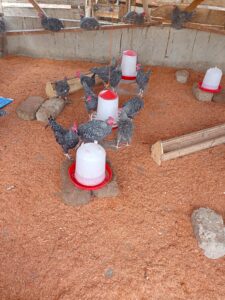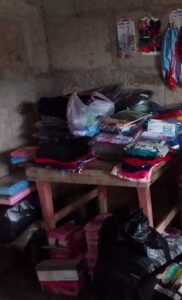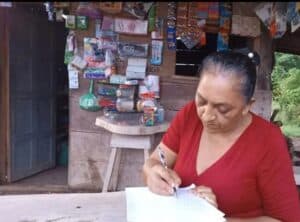
The Community of Jacinto Hernandez Gets Back on the Clean Water Wagon
By Orlando Montiel Salas – Clean Water Program Officer

The CAPS is working to keep clean water.
In the community of Las Azucenas, Nicaragua, there is a sector of this community called Jacinto Hernández. In 2013, the local mayor’s office constructed an electric pumping aqueduct in Jacinto Hernandez, which in 2021 supplies water to 470 people living across 130 households. The community formed a Water and Sanitation Committee (CAPS) to manage the aqueduct, and in 2016 Self-Help International installed a CTI-8 chlorinator in the water distribution tank.
By July 2019, the CAPS was not operating well, which meant that the water system’s administration, fund management, and service levels deteriorated. The community’s water coverage, water quantity, and water quality subsequently deteriorated as well. The system nearly collapsed.
Community members were reluctant to pay any water fee, so service went unpaid, the aqueduct wasn’t properly maintained, water stopped being chlorinated, and the chlorinator itself deteriorated. Many homes began having unreliable water coverage, while many others simply stopped receiving water completely. The pipes were inadequate and community members had stopped paying for electricity which was needed for the water pump to function.
Everything seemed lost and destined to fail, but halfway through 2020, the deteriorating situation in the community led community members to hold a community-wide assembly. There, a new CAPS board of directors was formed, and only one former member continued on to the new CAPS board.
The New CAPS Board Implements Changes
This board of directors has gradually worked to regain trust and improve community members’ well-being. They have also worked to make improvements to the aqueduct to maintain service and water chlorination.
Jilmer is the new president of the Jacinto Hernández CAPS. 31-year-old Jilmer has a wife and two daughters.He is enthusiastic about working for the community and makes his own time and resources available to achieve the sustainability of the aqueduct. Jilmer says that people were upset with the previous board of directors and demanded an explanation for leaky pipes and insufficient funds for aqueduct maintenance and for water that was not being chlorinated.
The new CAPS worked alongside the mayor’s office to improve the well’s perimeter and change the pipes’ diameter so that more water volume could flow to houses. They also reached out to Self-Help’s Clean Water Program to restore the water chlorinator so that community members could receive safer water in their homes and improve their health.

The community water tank is high off the ground.
Victoriano is the CAPS plumber, but since he is a senior citizen, Jilmer helps him place the water in the distribution tank. It is difficult and risky going up to the tank because it is positioned up high and people need to climb a ladder to reach it.
Elizabeth is the treasurer of the CAPS. Elizabeth reports that as of 2021, 80% of users are paying the water service fee. She says that the fee they pay is used toward the expenses of the water system and support a fund for the maintenance and sustainability of the aqueduct. She reports that the CAPS has now saved C $ 45,000 córdobas in cash from these payments, despite the 20% delay in payments. She says they send notifications to users who have pending payments and explain to them the importance of paying the fee for the aqueducts’ maintenance.
Leticia supports Elizabeth as treasurer. Leticia explains that the water users are now provided a report on income and expenditures, as well as information about available funds and improvements that have been made to the water system. They charge C$ 9 córdobas for each cubic meter of water consumed. The CAPS spends C $ 9,000 córdobas per month and has C $ 14,000 cordobas of income from the tariff payments, leaving them an additional C$5,000 córdobas per month for savings and equipment replacement.
Irma and Romel live in Jacinto Hernández, and receive water treated with chlorine tablets. They use this water at home to drink and for food preparation.
“As a mother, I see resuming water chlorination as something very positive because this way many diseases are avoided, and this is of great importance for us and a benefit for the entire community,” Irma said.
Jilmer feels committed to maintaining the aqueduct well, keeping the community informed, and submitting the CAPS economic report.
“We all have families and we need good quality water to avoid diseases,” Jilmer said. “Thanks to the constant monitoring and assistance of Self-Help International, our CAPS and our community have managed to rejoin the Clean Water Program to continue improving water quality and to contribute to the health of our community.”

 Previous Post
Previous Post Next Post
Next Post


